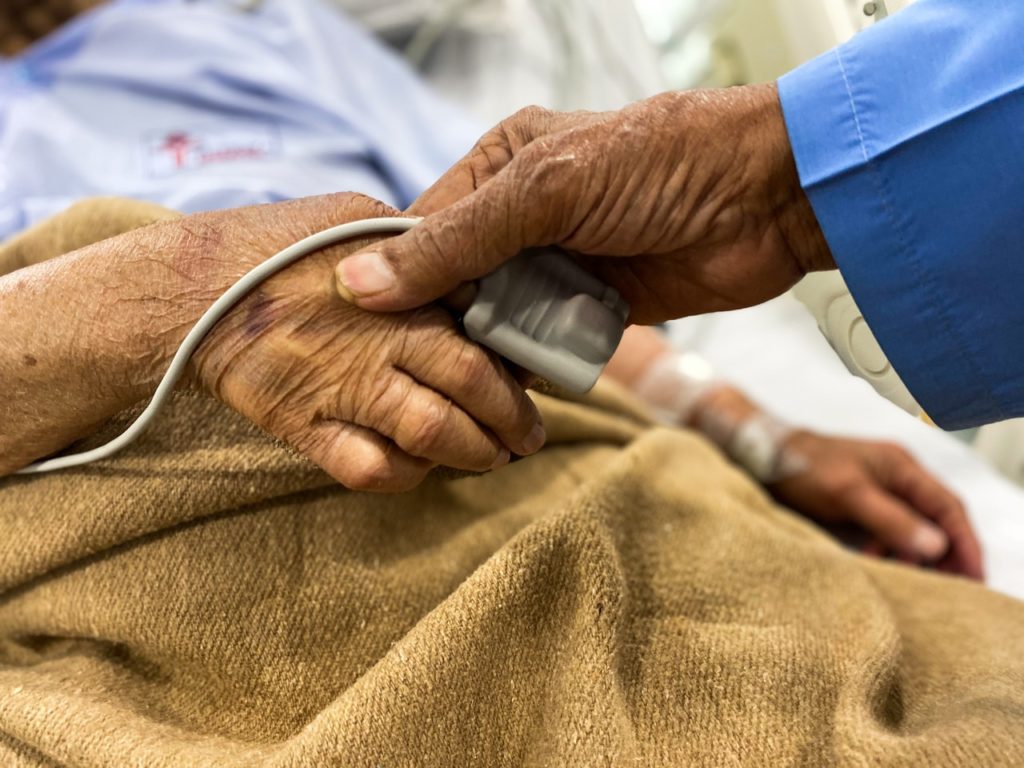
If something happens to you that inhibits your ability to make decisions for yourself and your health care, how will doctors and health care workers know your wishes? This is when an important estate planning document known as a Health Care Proxy comes into play.
A Health Care Proxy (which is also sometimes called a Health Care Power of Attorney or Advance Directive) is a document that gives someone else the authority to make healthcare decisions for you if you are unable to communicate such decisions. Each term can mean different things in different states, so it’s important to create a document specific to your state. Generally speaking, a Health Care Proxy allows you to legally state how you want to be cared for in specific medical situations, and gives authority to a person of your choice to make health care decisions on your behalf if you’re incapacitated.
It’s not always possible for you to be in control of your health care decisions, but you can choose who gets to make those decisions for you when you can’t. We never know when an emergency is going to happen, but if you plan ahead, you can control who is making your health care decisions for you. If something happens to you, who will your doctor look to to help them make decisions about your care? Is that person going to know what your choices are? Some of these health care decisions can be extremely hard and when you take control over those decisions, it takes the burden off your loved ones.
Can you make health care decisions before an emergency even exists? YES – when you have an executed Health Care Proxy and have discussed your wishes with the person you appointed. If you have a Health Care Proxy or Durable Power of Attorney for Health Care and something happens that leaves you incapable of making a decision, the person you appoint on your proxy can make decisions on your behalf.
Many Americans have never heard of a Health Care Proxy, but you may have heard of the document by a different name, such as an Advance Directive or Power of Attorney for health care. If you are medically incapacitated without completing one of these forms (depending on your state), health care decisions are hard to make, courts are often involved, families can be torn apart, and your wishes cannot be considered. We do things like brush our teeth to prevent cavities or exercise and eat nutritious food to stay healthy—why wouldn’t we want to prepare for emergencies before they happen?
Gentreo helps you learn, prepare and protect. With the help of Gentreo, a Health Care Proxy is free to start, easy to make, securely stored and easily shared. It helps you take control of your health care decisions by deciding who has the power to make these decisions when you can’t.

FAQs About Living Wills and Health Care Proxies
It is a document that gives someone else the authority to make healthcare decisions for you if you are unable to make and/or communicate such decisions. A Power of Attorney for Health Care or Living Will allow you to decide who you want to be in charge of your medical treatment and in some cases, how you want to be treated (i.e. Advance Directive). A Health Care Proxy or Health Care Advance Directive gives over full power to your designee to make all care decisions on your behalf once it is determined by the courts, your doctor, or official hospital staff that you no longer can.
In many cases, a Health Care Power of Attorney is the same as a Health Care Proxy. However, you need to know what your state calls the document and what language your state uses in its document. In the United States, we do not have a uniform law or name for the document which enables a competent adult (principal) to designate a person (agent) to make health care decisions for the principal in the event that he/she is unable to make and/or communicate decisions about medical treatment.
For instance, in Massachusetts you appoint a Massachusetts Health Care Proxy, but in Florida they would be called a Health Care Surrogate. In other states, like Missouri, they would be a Durable Power of Attorney for Health Care. It is important to note that generally there are two types of Powers of Attorney: one is strictly for health care decisions and the other is for money decisions. Here, we are only talking about a Power of Attorney for Health Care.
A Health Care Proxy or Power of Attorney for Health Care designates another person to make medical decisions if you cannot do so. Meanwhile, a Living Will allows you to list medical treatments and/or end of life decisions that you would or would not want if you became terminally ill and/or unable to make your own decisions. Some treatments that a Living Will may address include artificial nutrition and hydration, ventilation or CPR.
In some states, these documents include both features, which can make it pretty confusing. These documents are often very specific in what types of situations and applications of care they apply to. You need to check to see if your state honors Living Wills as three do not, with Massachusetts being one.
“Invoked” means to activate, so it is a Power of Attorney for Health Care that has been activated. When something happens that renders you unable to communicate or make decisions yourself, your primary care doctor, the courts, or the hospital team can invoke your Power of Attorney for Health Care, meaning that it will be activated and your wishes that you declared will be enacted.
An Advance Directive is a document that you complete directing what you want to happen in regards to your medical treatment if you become incapacitated. A Health Care Proxy or Power of Attorney for Health Care are types of Advance Directives because you are naming someone to act on your behalf in the future if you cannot make health care decisions. Usually, however, when Advance Directives are being discussed, it means that a person has written specific instructions for his/her doctor about what life sustaining treatment he/she wants, like those expressed in a Living Will.
Most states have their own Health Care Proxies that they offer, or different institutions or groups in the state offer; however, many are often very similar. Most states do not require a specific form, but just require that your form is witnessed by the correct number of witnesses who are of a valid age per that state. However, some states have different documents or alternative names for their documents, for example, if you have a Texas Directive to Physicians and Family or Surrogates it is not necessarily the same as a Virginia Advance Directive for Healthcare.
But, if you have a Health Care Proxy or Health Care Advance Directive, it is most often applicable in other states. As long as your home state’s Health Care Proxy satisfies the laws of the other state, it will be valid. If you spend time in multiple states, it is recommended that you have a Health Care Proxy for each state. In some instances, the state in which you did not create the Health Care Proxy or Advance Directive may limit what your document can do if what you want to do is not legal in that state.
Most states have a type of “OLST” or “MOLST” form, which are Orders for Life Sustaining Treatment or Medical Orders for Life-Sustaining Treatment. These forms are for individuals who are diagnosed with a life threatening disease, and they are forms that you can provide your Health Care Proxy to give them specific instructions on how to provide treatment. Contact Gentreo to learn more about what is recommended in your state.
Every adult needs these documents, and it’s never too early. No one can predict the future, but you can prepare for it. A completed Health Care Proxy enables you to be in control and appoint someone to act on your behalf if you are unable to make and/or communicate health care decisions.
Health Care Proxies become most important when you can’t make decisions on your own, for example, when you’re unconscious or if you’ve lost your mental capabilities. They only become effective when you are no longer able to make decisions or you cannot communicate for yourself.
The person you appoint should be someone you trust and with whom you are able to discuss your health care issues. Your Power of Attorney for Health Care needs to be able to manage difficult situations and be willing to advocate for you and make decisions regarding serious issues, like life–prolonging treatment, in accordance with your values.
If you want to change the person you appointed for your Power of Attorney for Health Care, simply fill out another form, have it executed; saved and share it with your new Power of Attorney for Health Care. The last Power of Attorney for Health Care that was executed will be legally held valid if something happens to you, provided you had capacity when you completed it.
If you become incapacitated or you are no longer mentally capable of making decisions, a Health Care Proxy cannot be completed. If you have no Health Care Proxy or Living Will and you become incapacitated, a legal court process becomes necessary for someone else to make these decisions on your behalf, so your personal decisions would then be in the control of lawyers and judges. This is why it’s so important for every adult over the age of 18 to complete and execute a Health Care Proxy.
Once your document is completed, it should be stored in a secure, digital location (like the Gentreo Digital Family Vault) so that you and your Health Care Proxy can access the document whenever you need to. A copy should also be given to your doctor(s).
Understanding a Living Will As Part of Your Health & Estate Plan
A group of moms recently started a discussion on Facebook about estate planning, and specifically, they were saying how they really needed to get Living Wills so as to protect their children from going to people they didn’t want them to go to if something happened to them (there were some entertaining examples of odd relatives). However, a lot of the information the moms had was wrong, but they all wanted to protect their families. Let’s discuss what a Living Will really is and why having one as part of your estate plan is a good idea, just not what the moms thought.
First of all, the purpose of health directives, including Living Wills or Health Care Proxies, is to communicate your preferences concerning your medical treatment in extreme situations in which you cannot communicate, even when it is the end of your life. Medical professionals make the initial determination as to whether you have the capacity to make your medical treatment decisions. Then, physicians can rely on your written legal document (Living Will or Health Care Proxy) outlining your medical preferences versus obtaining a consensus answer from your family regarding your treatment.
A Living Will is a health directive that specifies your medical care wishes, including withholding lifesaving treatments, use of pain medication, withholding of nutrition and hydration, and the removal of life support. Living Wills can also include directives regarding quality of life, personal hygiene, modesty, and spiritual or religious life.
Health Care Proxies and Living Wills are not about who is going to take care of your child if you are in a coma; they are for how you want to be cared for when you are in the coma. To complete a document that states your wishes for whom will care for your minor children or pets if you are incapacitated, complete a Power of Attorney and/or a Power of Attorney for Pet Care. If you are worried about what happens when you pass away, you should complete a standard Will.
Health directives make a stressful and emotionally turbulent time a little bit easier for your loved ones by making your wishes known to them, ultimately saving them from making difficult choices. You’ve made the decision ahead of time. This is why it is so important to have a Gentreo state-specific Health Care Proxy, which includes questions about life sustaining treatment, like those addressed in a Living Will.
If you want to add a provision to your Living Will naming someone to make medical decisions on your behalf in the event you are unable to make decisions, then you’ll need to include a separate document known as a Health Care Proxy. A Health Care Proxy is a health care surrogate, allowing you to appoint a person who then has the authority to make medical decisions for you if you are unable to express your medical preferences.
In most states, a Health Care Proxy covers most of what is in a Living Will. Thus, you often don’t need a Living Will if you have a Health Care Proxy. And, in some states Living Wills are not legal, but again the Health Care Proxy already most likely includes what might be in a Living Will. You’ll appoint one person as your Health Care Proxy, and then you can also appoint one or more successors in case your first choice is unavailable. Be sure to check with your proxy that they are willing and able to carry out your wishes. For example, their religious views may prevent them from carrying out your preferences.
Because the law varies state to state, be sure to prepare your Health Care Proxy in the state where you reside. If you reside in more than one state, consider preparing Health Care Proxies for both states. And if you change your mind regarding your health care treatment or end of life decisions, you can destroy your current Health Care Proxy and create a new one. Depending on your state of residence, the Health Care Proxy document may be a standard or statutory form. Rather than use generic forms, Gentreo provides you with the ability to create state-specific documents, including state-specific Health Care Proxies.

Choosing Your Health Care Proxy
As we’ve discussed, a Health Care Proxy, also known as a Power of Attorney (POA) for Health Care, is a legal document that lets you decide who you want to make your medical decisions in the event you are unable to.
There are many benefits to having a Health Care Proxy. Your appointed proxy (also known as an “agent”) will speak for you when your treating doctor determines you are not able to make or communicate your own health decisions. This document allows you to specify the health care decisions to be made, including your choices regarding organ donation and resuscitation orders.
A Health Care Proxy is an essential component of your estate plan, and allows for health care decisions made in your name to be based on your values and your wishes. Alternatively, if you do not choose one, your loved ones may have to go through a court proceeding to make the necessary medical decisions for you. This can result in legal expenses and appearances before a judge, time they could have used to be with you in the hospital instead. If your loved ones disagree, a court will in all likelihood appoint a neutral stranger to make your health care decisions for you.
Gentreo’s Health Care Proxy tool contains sections where you can input explicit instructions and optional instructions. Explicit instructions tell your agent what they cannot do, and optional instructions tell them what they should do to fulfill your wishes. For example, optional instructions are a good opportunity to include any specific religious or spiritual requirements you wish for your agent to follow. These additional instructions can be a useful tool to further explain what your agent is and is not permitted to do on your behalf in order to carry out your wishes.
Here are some considerations for how to choose your health care agent:
Privacy
Because this person will be responsible for making your health care decisions for you when you cannot advocate for yourself, it is important to trust them. Do you have a loved one whom you know to be trustworthy and could take on the important role of being your Health Care Proxy?
You should be comfortable with the person you choose accessing your medical records and knowing your health conditions.
Location
The proxy you choose should live close enough to you or be easily accessible in the event of an emergency. It is strongly recommended that you have at least one alternative agent to carry out your wishes in the event your primary agent is not available. If you reside in multiple states and have Health Care Proxies in those states, you may want to appoint a different person for each Health Care Proxy, based on their location as well.
Impact
Are you healthy and creating this document in the event of an emergency? Or have you just been diagnosed with a serious illness that may soon impact your ability to make health care decisions? Your agent may be burdened with making life and death decisions for you. Your loved one should be able to withstand pressure either from your treating team or from other loved ones and advocate for what you would want.
Choosing who to pick as your health care agent, and who to pick as your alternate(s), is a critical part of your overall estate plan to protect your choices and help your loved ones in a time of crisis.










